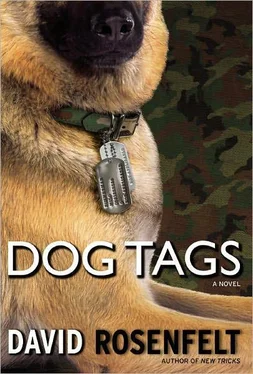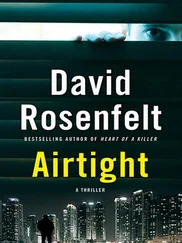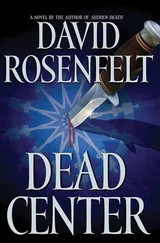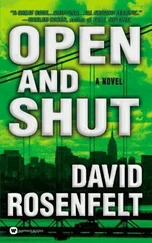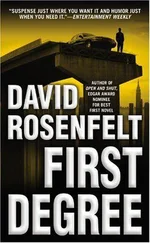CHAPTER 39
THE INSTITUTE FOR ENERGY INDEPENDENCE’S MOTTO IS “THE FUTURE IS HAPPENING ALL AROUND US.” Which may be true, but the directors chose a building that stopped representing the future around 1908. It’s old and run-down, with an elevator that has to make rest stops on its way up to the sixth-floor offices.
My only-rich-companies-have-good-looking-receptionists theory takes a hit when the young woman sitting at the lobby desk is an absolute knockout. She brings me back to Eliot Conyers’s office, and on the way there I only see three other employees. This does not appear to be a thriving institute.
Conyers has the look of a guy who works for a living, complete with loosened tie and rolled-up sleeves. He has an earnestness about him, the type who really cares and thinks he can make a difference. But if he’s been working on energy independence, he doesn’t have that much to show for it. If George Washington had the same independence-achieving record, we’d all be eating fish-and-chips.
He welcomes me with a smile and an offer of a Diet Pepsi, which I gratefully accept.
“Thanks for seeing me,” I say.
“I was afraid that if I didn’t, Vince would be pissed at me. Life is too short for that.”
I laugh. “Believe me, I know what you mean.”
“So what can I do for you?”
“I’m working on a case that—”
He interrupts. “I know. The Erskine murder.”
“You’re familiar with it?” I ask.
He nods. “Only because it’s tied to the al-Hakim killing. That was a rather major event in my world.”
“How so?”
“When we invaded Iraq, the media talked about how people were looting stores, museums, even ammunition depots from the previous regime. Unfortunately, that was kid stuff compared with the way the country’s oil was being stolen. The corruption in the oil ministry was mind-boggling, and it continued for years. On some level it’s continuing now.”
“How much money are we talking about?”
He smiles. “Many billions. Many, many billions.”
“And we couldn’t stop it?”
“That depends on who you mean by ‘we.’ If you mean the American government, we could have stopped a lot of it if we put our mind to it. But if you remember, our troops were otherwise engaged. And we farmed out a great deal of what we did to private contractors, many of whom saw a chance to become unbelievably wealthy in a very short time.”
“Where does al-Hakim fit in?” I ask.
“As the military situation got better, we started putting pressure on the Iraqi government to get the corrupt oil system under control. When the pressure became too great to resist, Yasir al-Hakim was appointed to head up the oil ministry. He was the man we insisted on.”
“Because he was honest.”
He shrugs. “That was his reputation going in, but of course you never know until someone is put into the position. He didn’t get a chance to deliver on his promise, which was to go through the industry with a scrub brush.”
“Which made him a target.”
“I figured that if he was for real, his life expectancy would be about a week. He lasted six, but three of them were in a coma after the explosion.”
“And his death has had a major impact?”
Conyers nods vigorously. “In a couple of ways. In the long term, it’s had a chilling effect on other potential reformers; martyrdom in that part of the world is limited mostly to religion, not business or government.”
“And in the short term?”
“It sent the price of oil way up. The market doesn’t like instability and uncertainty, so the explosion was a major event. Since then the price has gone down considerably, mostly because of economic conditions.”
“So who killed al-Hakim?” I ask.
“I can’t give you names, but you can be sure it was the people whose profit al-Hakim was preparing to eliminate.” He shakes his head sadly. “They took a sixteen-year-old girl, probably convinced her she was on a mission from God, and sent her in to blow herself up.”
“But she couldn’t have gotten there on her own, which is where Erskine came in.”
He nods. “Do I have proof of that? No. But that would be my first, second, and third guesses. And his murder makes it even more likely.”
“Any idea why they waited until the foreign businessmen were there for that conference?
He shrugs. “Al-Hakim knew he was a target, so he was almost never out in public. But for this event, he was probably assured by the Americans that we had his back. How’d that work out?”
We talk a little more, but Conyers has no more information to offer. I thank him, and as I’m leaving I ask, “So are we going to get energy independence?”
He smiles. “Not this week.”
CHAPTER 40
PATIENCE WAS NEVER SOMETHING WILLIE MILLER EVER REALLY HAD PATIENCE FOR. It made sense, seeing as he had wasted seven years sitting in a prison for a murder he didn’t commit. He certainly wouldn’t want to waste more of his life waiting or sitting around. But the truth was that Willie was an impatient person long before he ever went to prison, and that trait simply continued afterward.
Yet Willie’s lack of patience was never quite as pronounced as in the days after he killed Ray Childress. He had told both Andy and Laurie that he wanted to be involved in the investigation, that he was anxious to help in any way he could.
They had both assured him that he would get his wish, but he felt they were just putting him off, and in the days since they hadn’t come to him with anything.
He didn’t want to keep bothering them, but he had this problem: Somebody had paid Ray Childress to hold a gun on Sondra, and that somebody was still walking around free. That was simply intolerable.
It was time to talk to Joseph Russo.
Joseph Russo had been convicted on a weapons charge just before Willie’s retrial, and their stay in prison had overlapped for almost three months. One day Russo was attacked by three other inmates in the prison yard, men who either didn’t know who Russo was or who were trying to make a name for themselves.
Russo was a top lieutenant in the Vincent Petrone crime family, which considered New Jersey its personal playground. But that didn’t help him that day in the prison yard, alone and facing three men with makeshift knives.
What helped him was Willie Miller. Russo and Willie weren’t friends, but they had conversed a few times and developed a prison form of respect. What Willie did not respect was what was about to happen to Russo. Three against one, especially when the three had weapons, was not the kind of competition that Willie would look favorably on. And it was certainly not the kind of thing he would look away from.
The whole thing took about forty seconds, and an hour after that Willie and Russo were back in their cells, and the three men were in the hospital. No action was subsequently taken against either Willie or Russo, mainly because the entire incident was captured by the prison surveillance cameras.
Russo was appropriately grateful, and vowed that if Willie ever needed anything, all he had to do was ask.
Now was the time to ask.
The problem was that Willie had no real idea how to do that. He hadn’t seen or spoken to Russo in years, though he had heard Russo had only spent eight months in prison. It wasn’t like he had his address or phone number, but it was going to take much more than that little glitch to stop him.
It was pretty well known that the Petrone family used the Riverside area of Paterson as their base of operations. It was a collection of unassuming streets and houses, rather old-fashioned, and completely free of crime. Kids played out front without parental supervision, secure in the knowledge that no one in their right mind would dare harm anyone in that neighborhood.
Читать дальше
